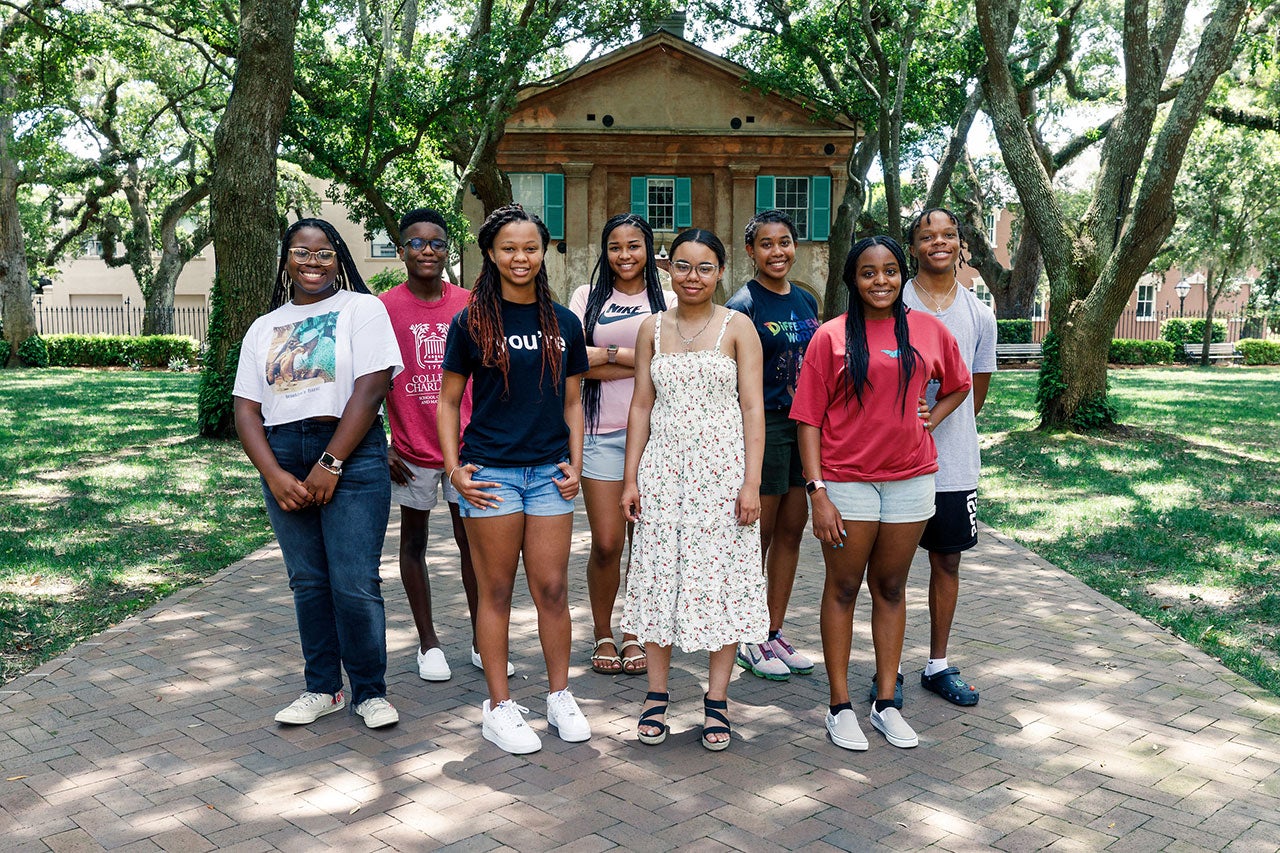Above: Members of the first class of the 1967 Legacy Program (L-R): Miyah Jackson, Jalen Newell, Amber Anderson, Ashanti Carter, Treashure Richardson, Madison Meeks, Tayelor Morgan and Gaige Johnson. Not pictured: Chandler Harris, Jasmine Palmer and Kahlil Wright. (Photo by Heather Moran)
After more than a year of preparation, Valerie Frazier, associate professor of English and director of the 1967 Legacy Program, is ready to welcome the first cohort of 1967 Legacy Scholars at the College of Charleston. She has developed an intensive four-year program for the inaugural class of 11 first-year students — 10 coming from across South Carolina and one from Mississippi.
One 1967 Legacy Scholar, Treashure Richardson, of Hopkins, South Carolina, plans to major in astrophysics and minor in biomedical physics and biology.
“I want to go to Mars and the Jupiter moon, Europa, which has Earth qualities – although it’s farther away and colder,” says Richardson. Concerned with the threats of climate change, her goal is to join NASA and help people find another planet on which to live.
When looking for scholarships, the 1967 Legacy Program, which is housed under the Office of Institutional Diversity and aims to support the academic and professional success of Black students, stood out to Richardson, who was intrigued at being able to learn more about African American history.
“I anticipate learning about the history of Charleston, possibly my history and the history of African American Charlestonians,” she explains.
History is a big focus of the program. In fact, all 1967 Legacy Scholars are required to take the freshman seminar 1967 Legacy and Beyond.
“The course will be an immersive experience as we figure out the history in and around 1967,” explains Frazier, who notes that 1967 is the year the College integrated. “We’ll explore how time and change bring about revelation.”
To support the course Aaisha Haykal, manager of archival services for the Avery Research Center for African American History and Culture, will work with Frazier as an embedded librarian to develop course assignments and support student research.
The course features multiple experiential learning opportunities, including:
- Chef BJ Dennis, who attended the College and is now featured on the Netflix program High on the Hog: How African American Cuisine Transformed America, will provide a tasting of foods from the Gullah Geechee culture.
- At Penn Center on St. Helena Island, the students will work with the University of Georgia Wilson Center to study restorative justice.
- As part of the Provost’s Critical Conversations program, each student will research an African American who helped change the world and hold a Tedx-style talk on these figures, which will be open to the public.
Richardson also hopes to become empowered as a leader in the CofC community. She has already been connecting with members of the community as president of @minoritycofc on Instagram, which is geared toward freshmen, but also includes upperclassmen.
“I want to link up all members of AALANA [African American, Latin American, Asian American, Native American and Allies],” explains Richardson. “It has really been great to see the group growing and more students coming together.”
Richardson will be able to hone her professional skills further this fall when the 1967 Legacy Scholars undergo 13 weeks of professional development aimed at getting them workforce ready. The experience includes mentorship from members of the College’s Black Alumni Council.
Additionally, as part of their efforts to create a more engaged community, the cohort will identify a community service project to work on together.
“Of course, the scholars will also have decompression activities where they can relax and explore Charleston,” says Frazier. “Our upperclassmen Legacy Ambassadors, who have experience at the College, will peer mentor and organize cultural and extracurricular events to help the scholars socialize and connect.”
If the first semester is any indication, the 1967 Legacy Scholars are poised to be leaders on campus and beyond.




